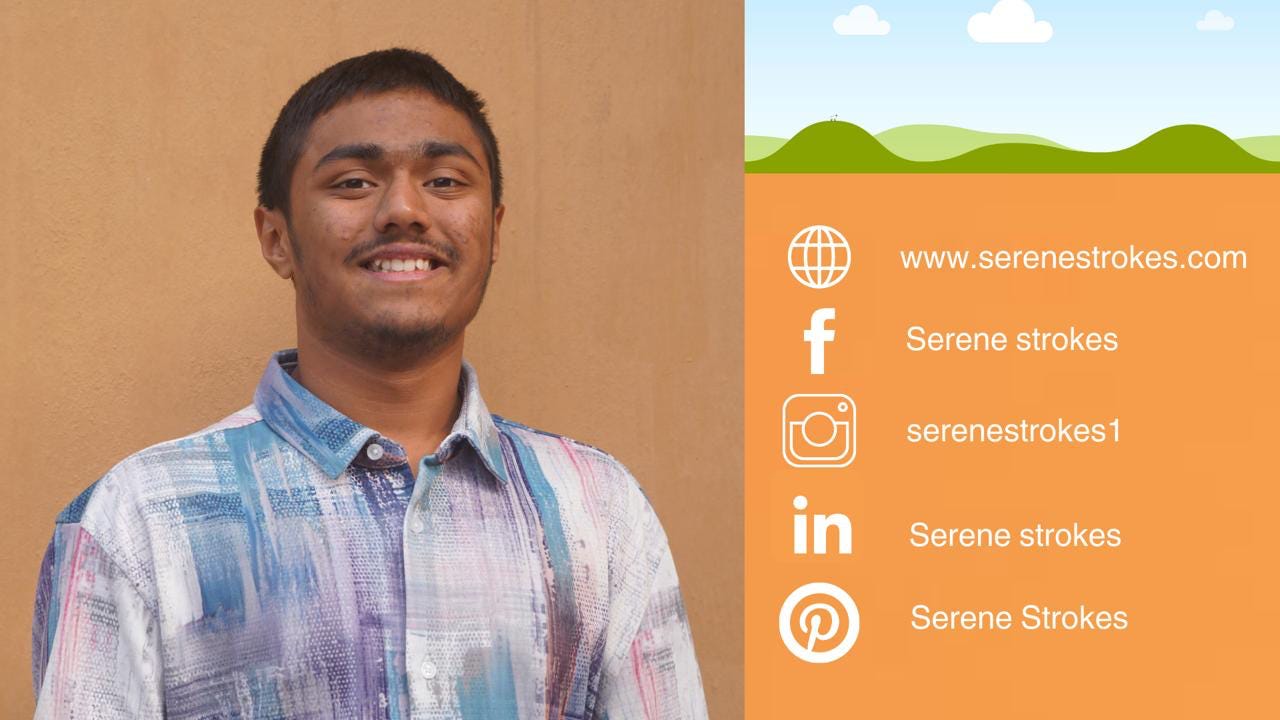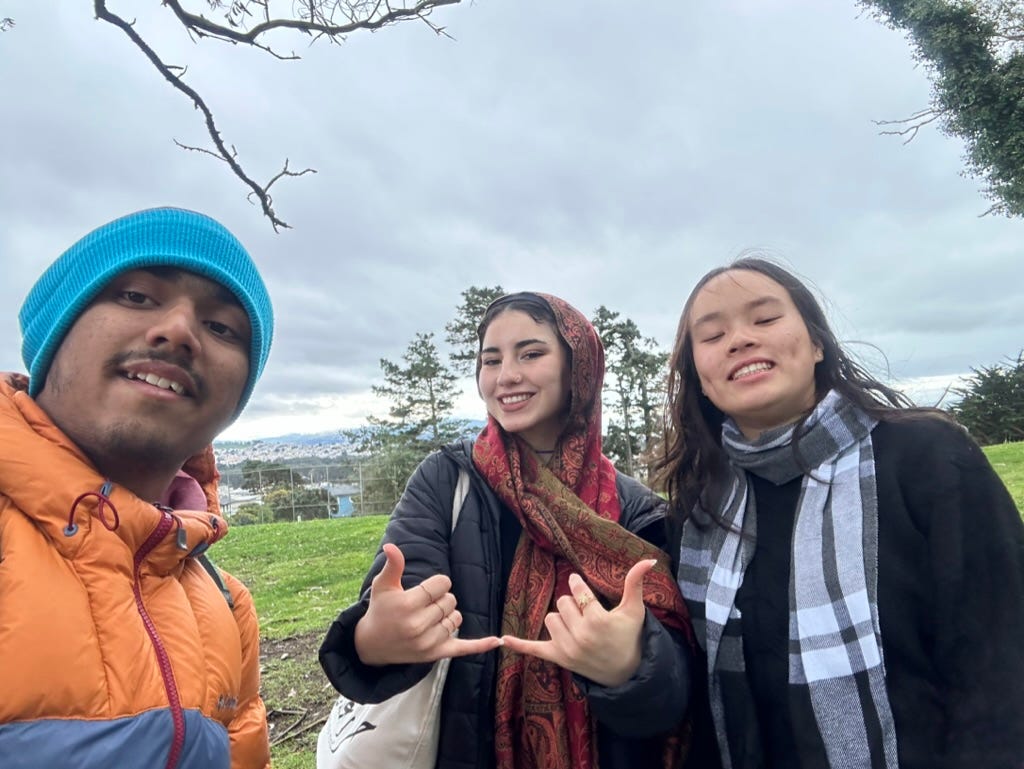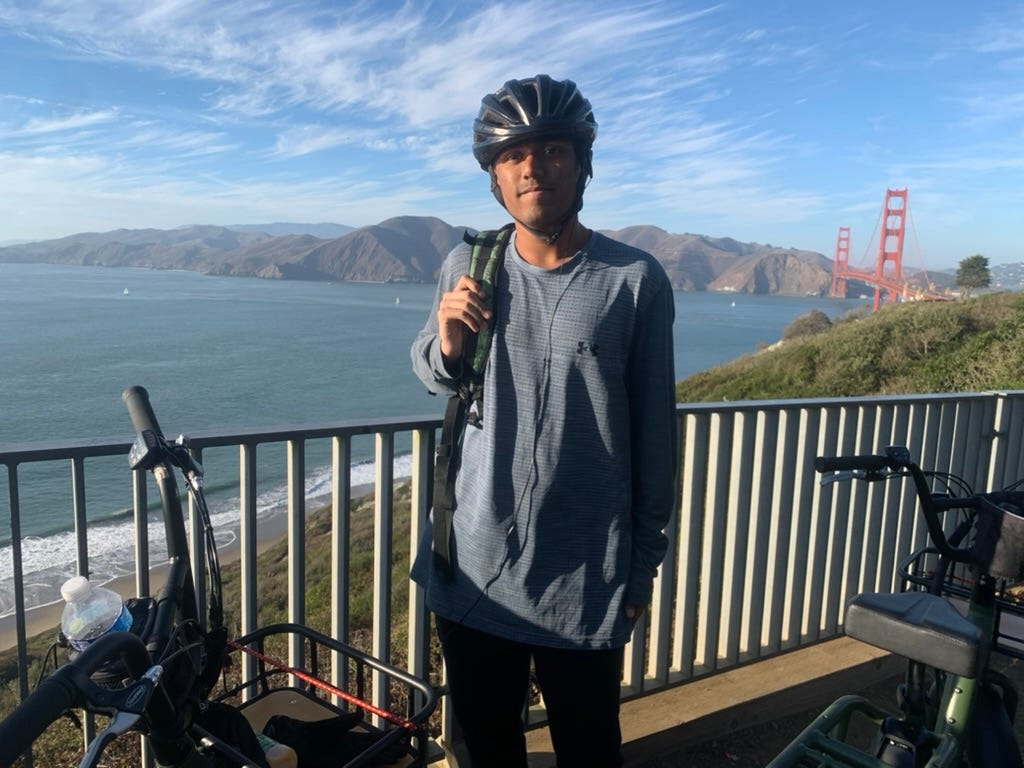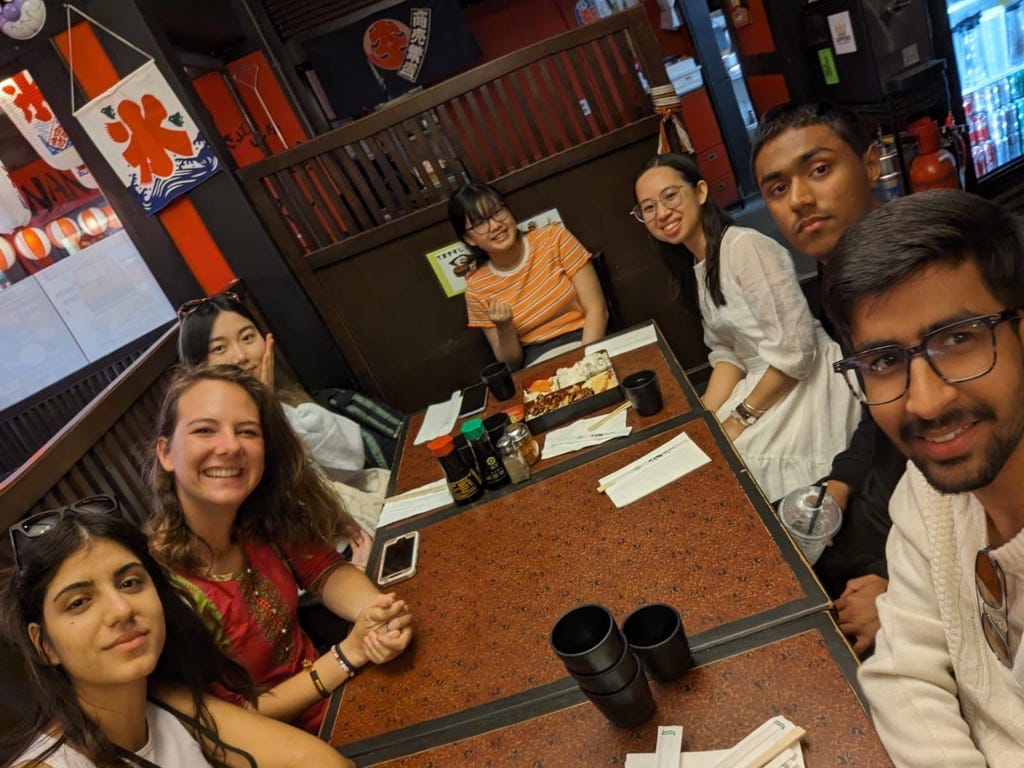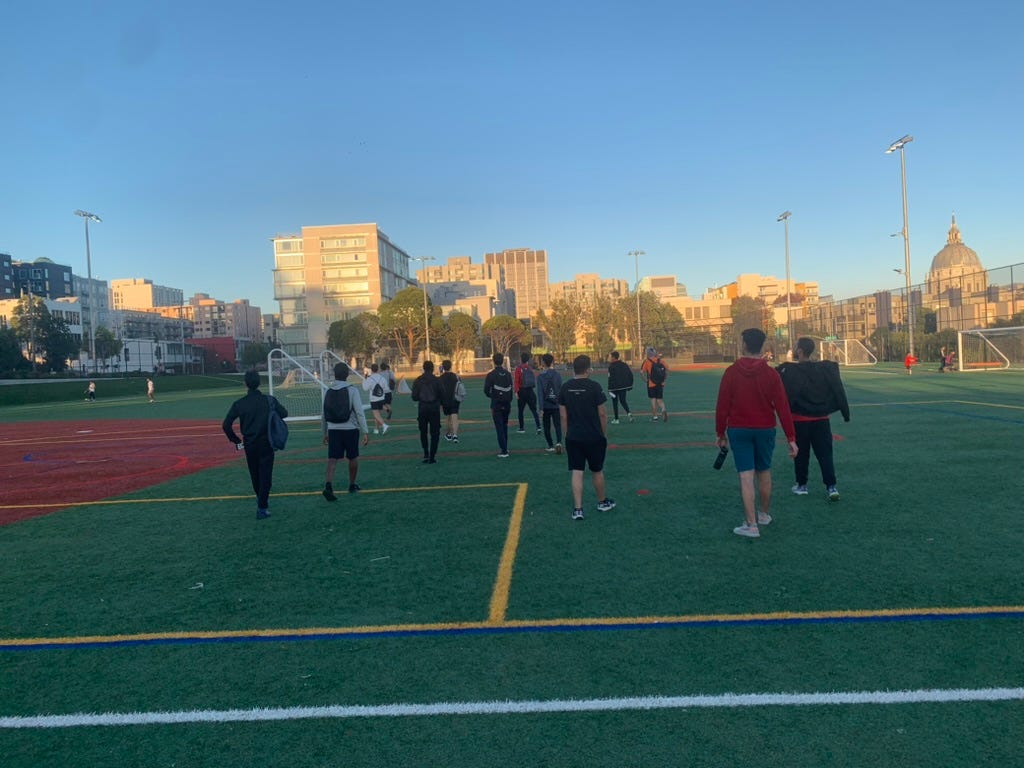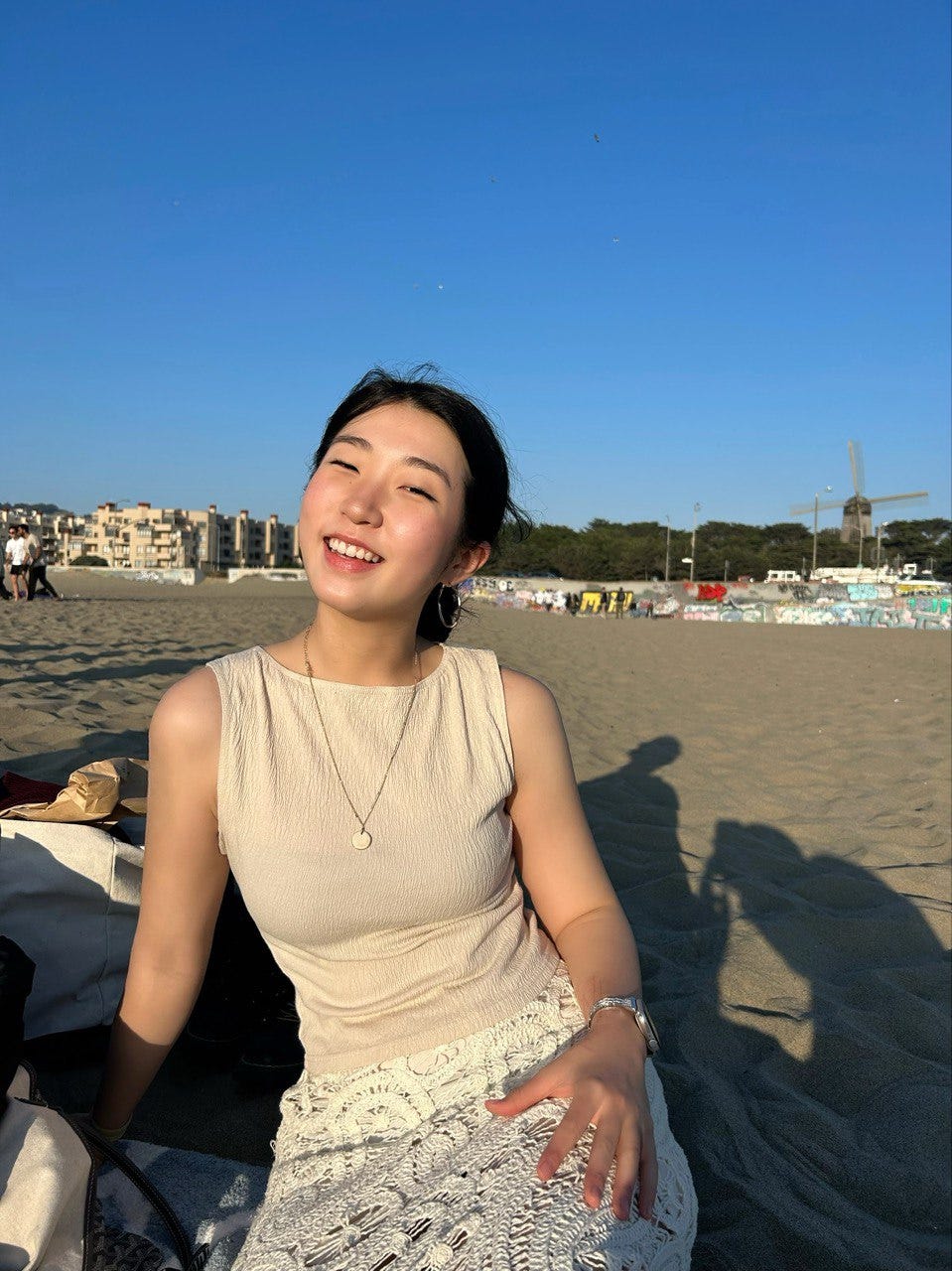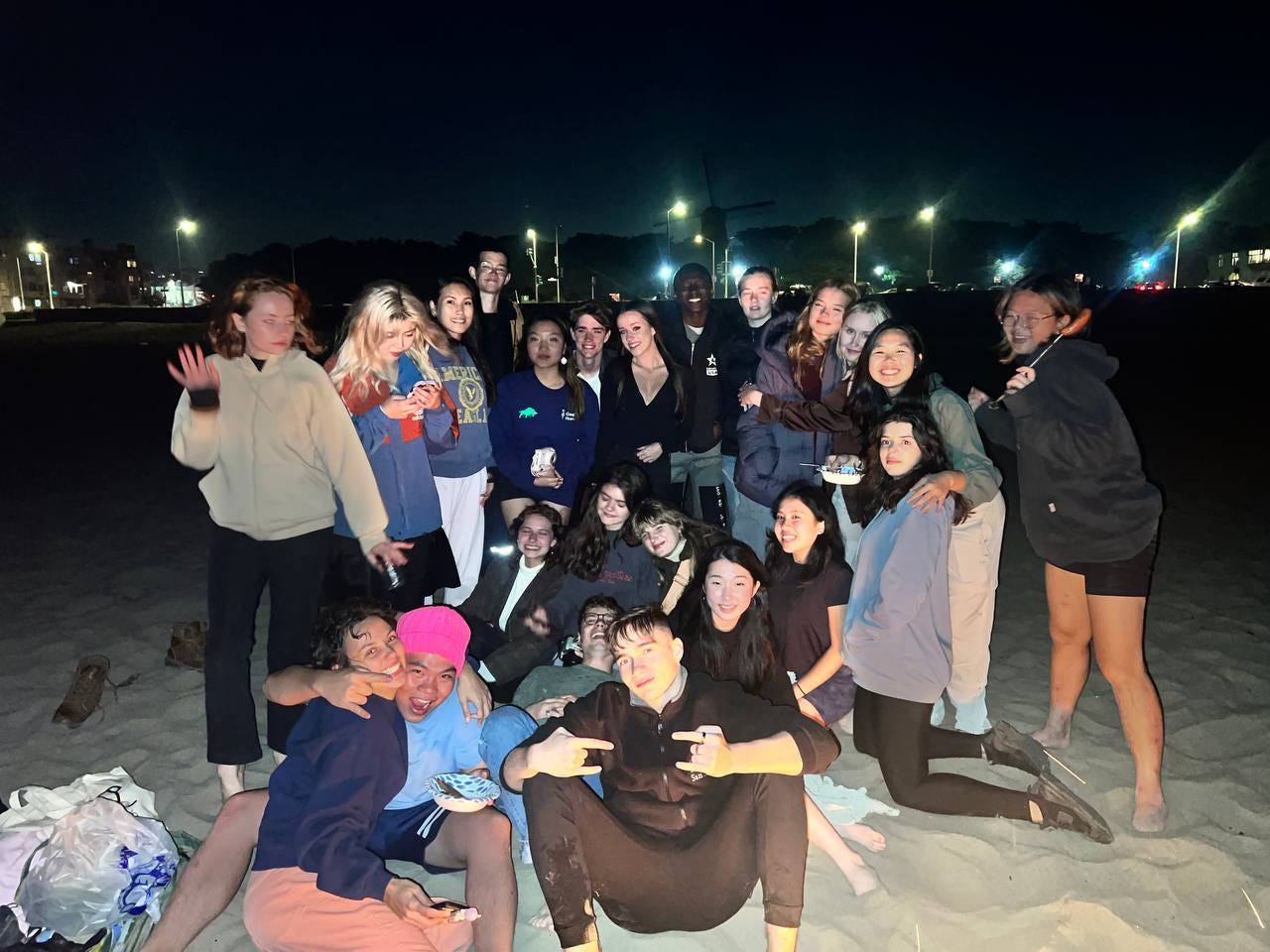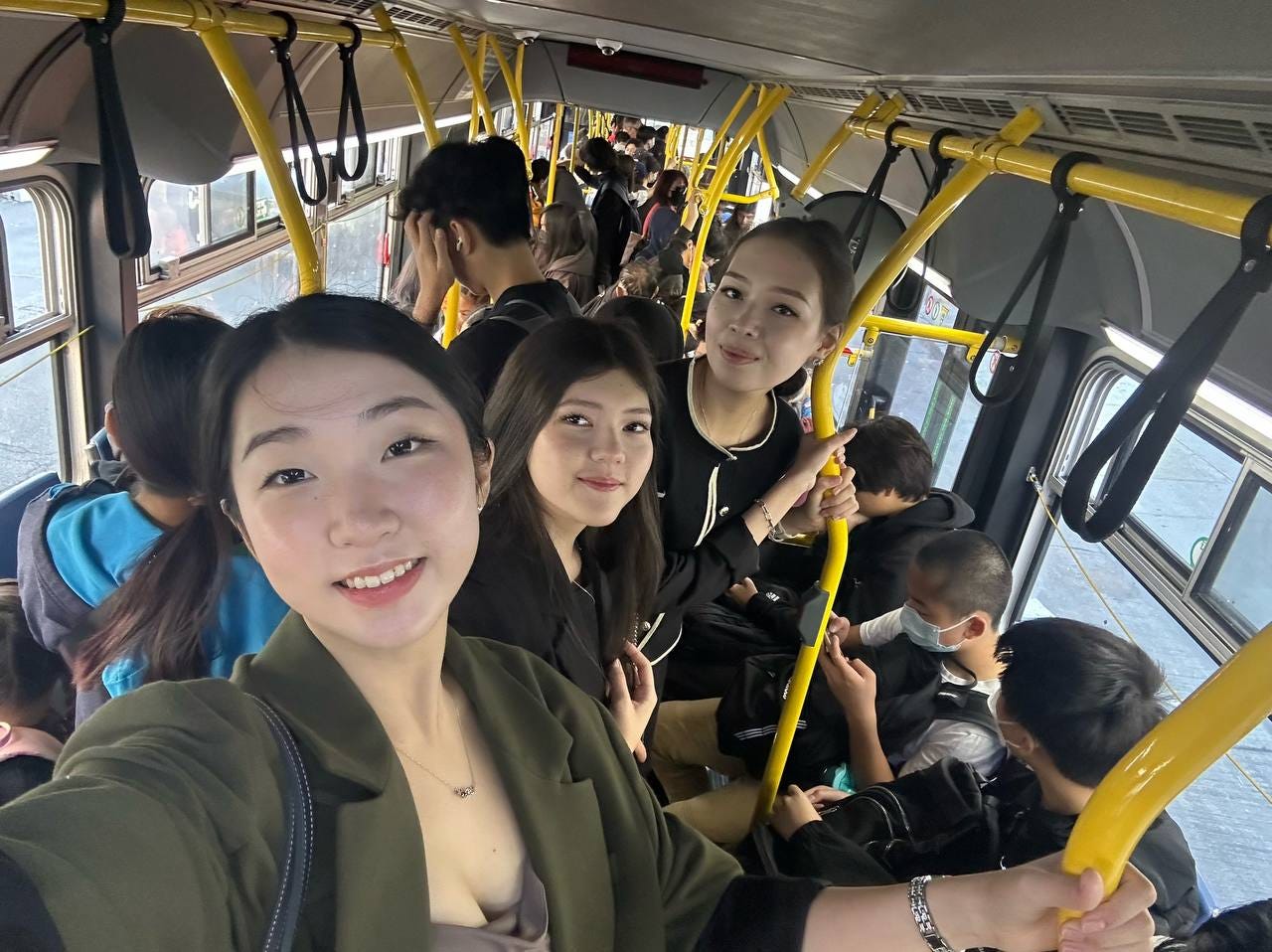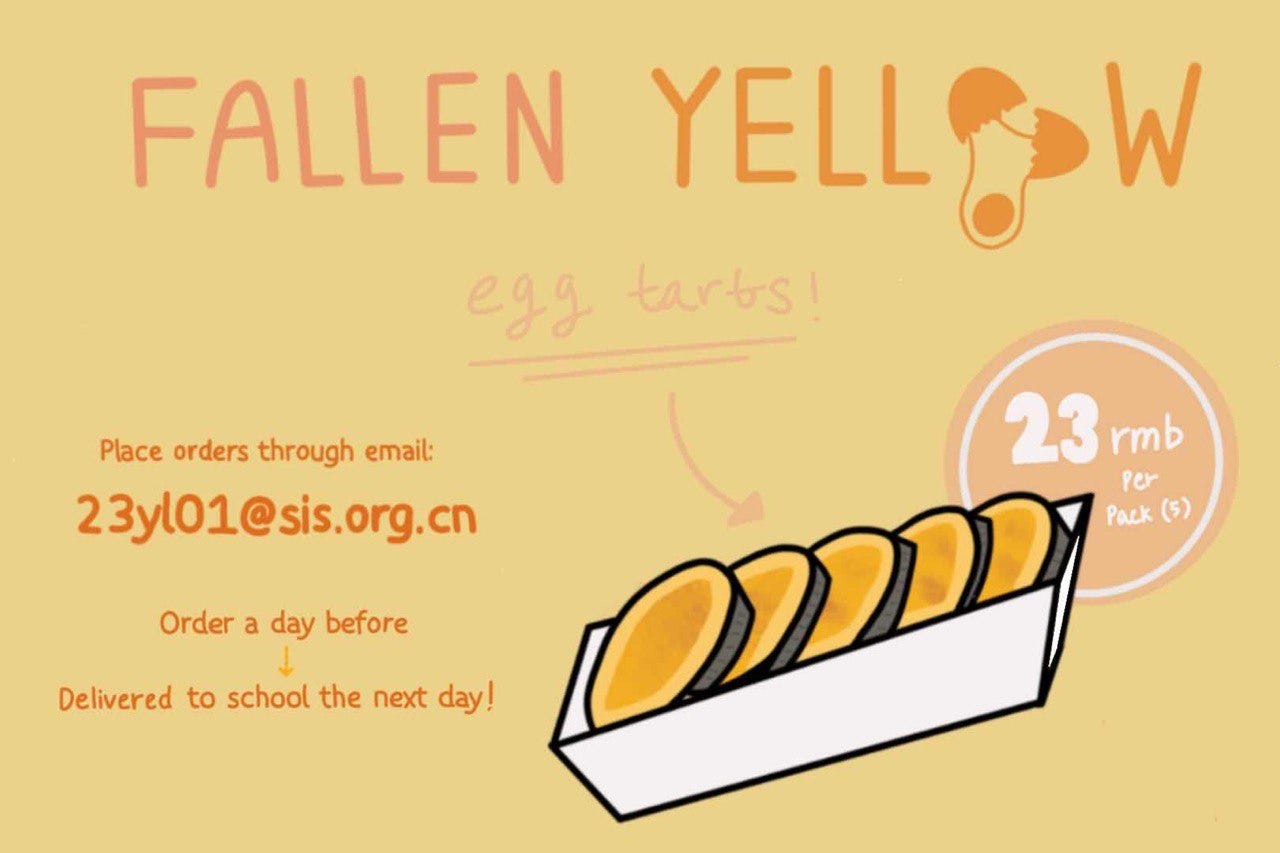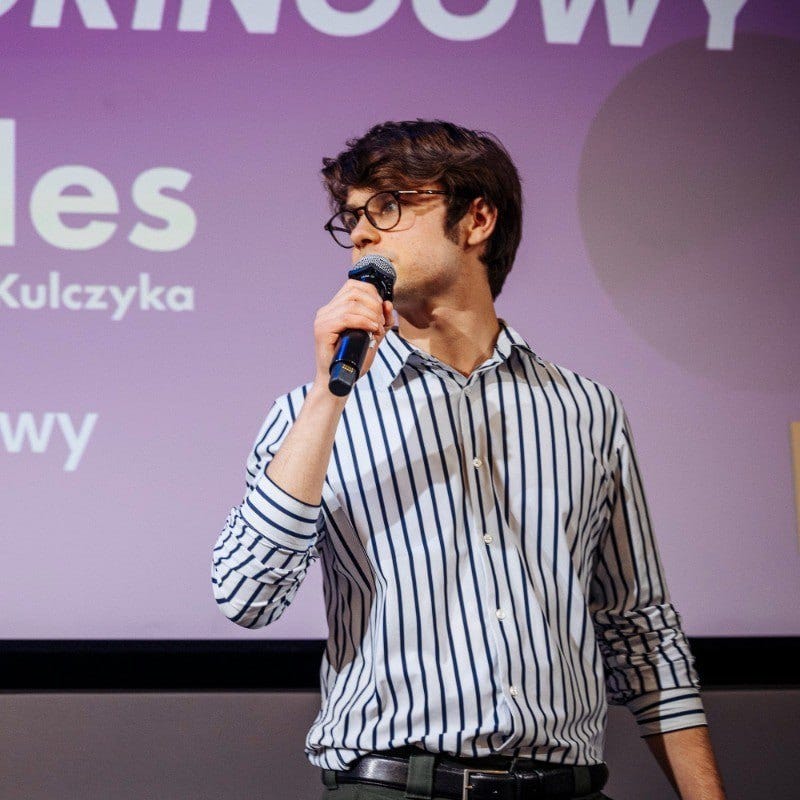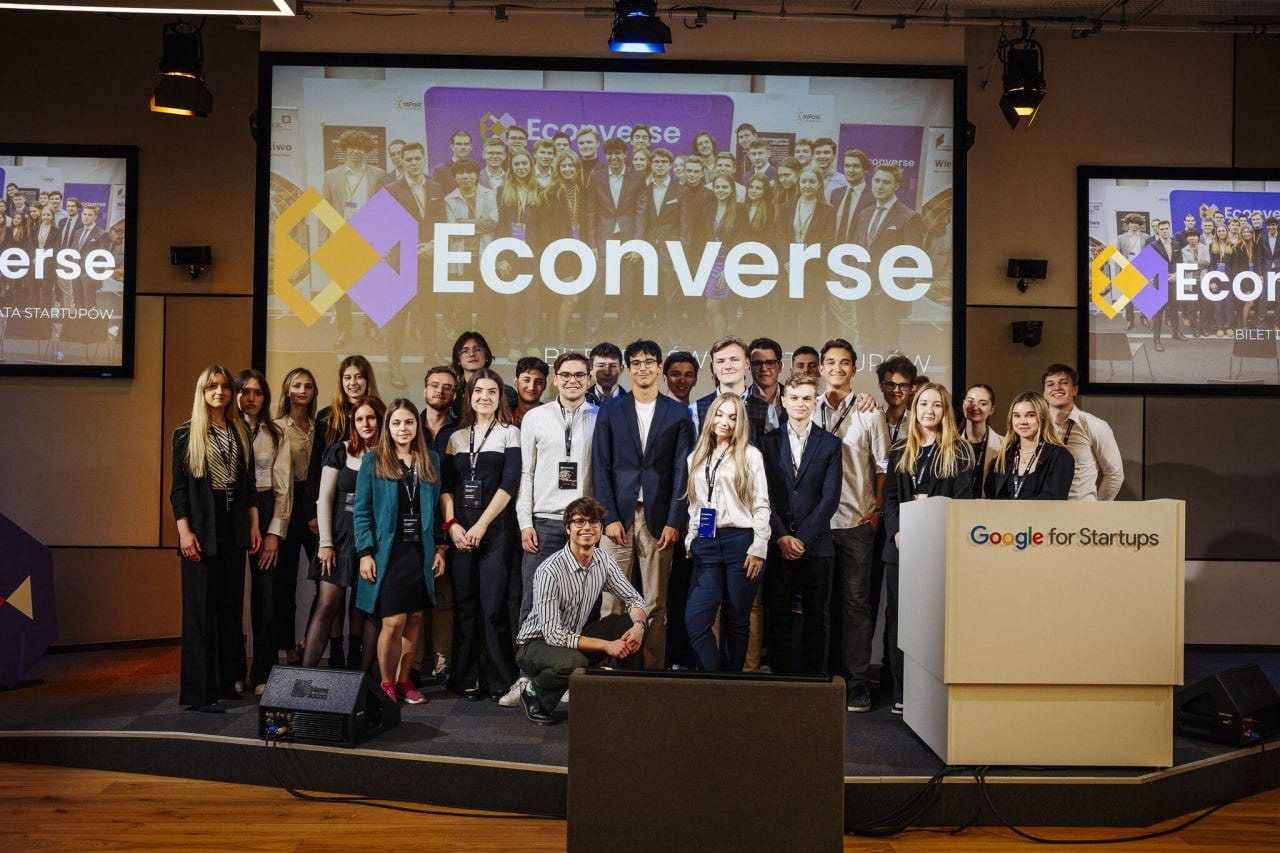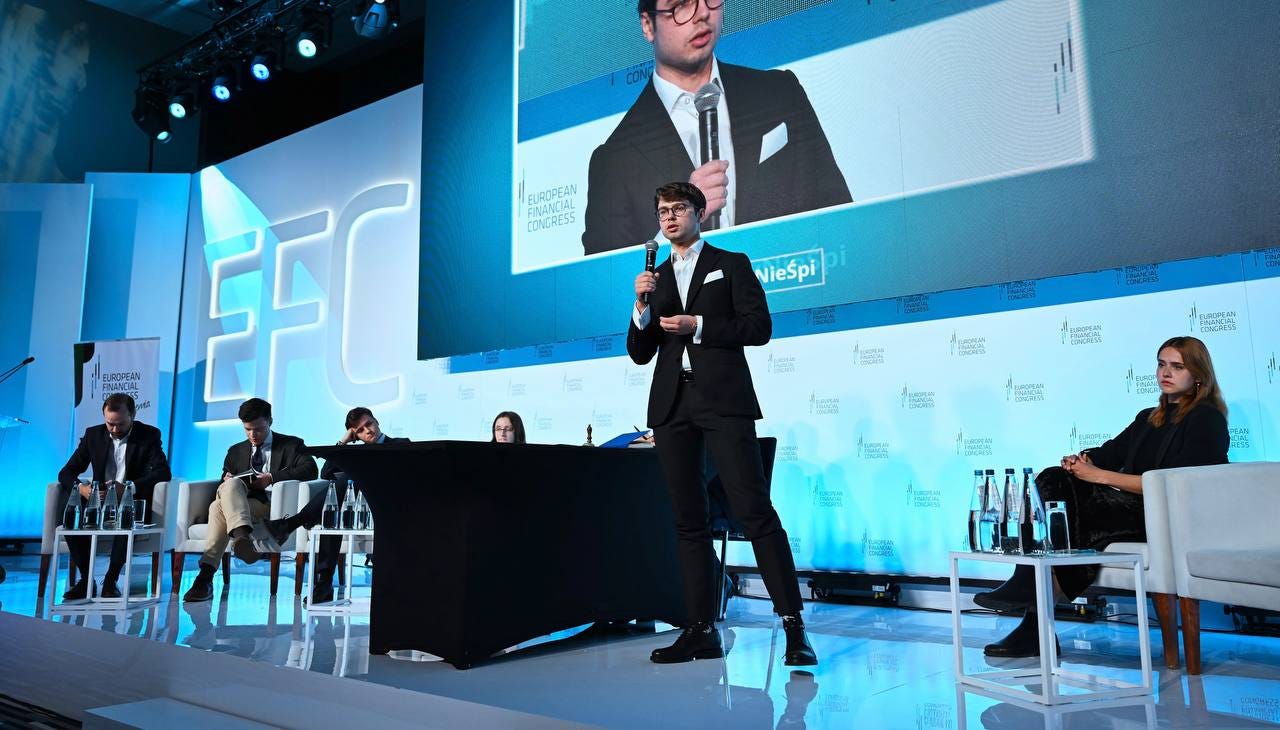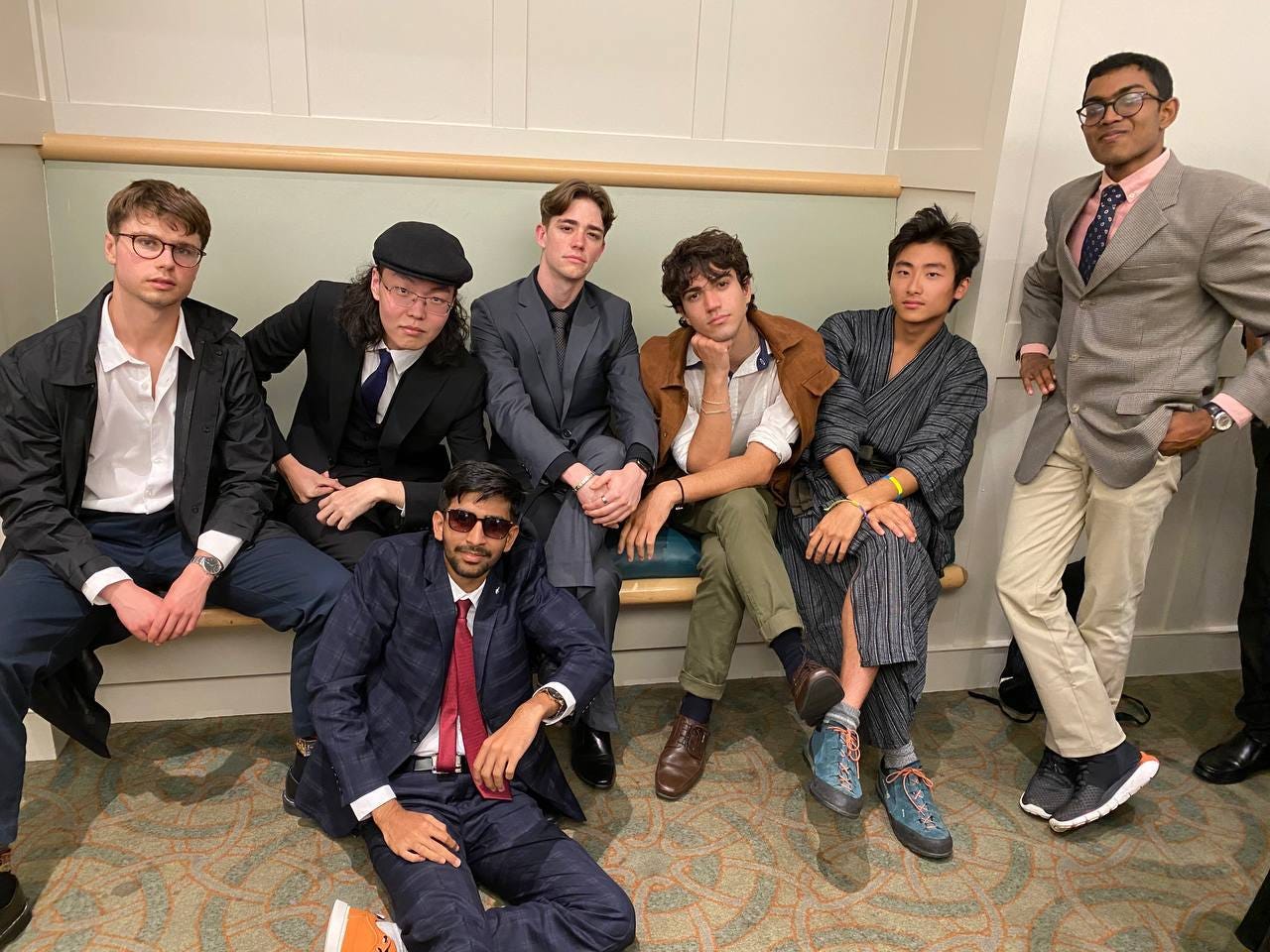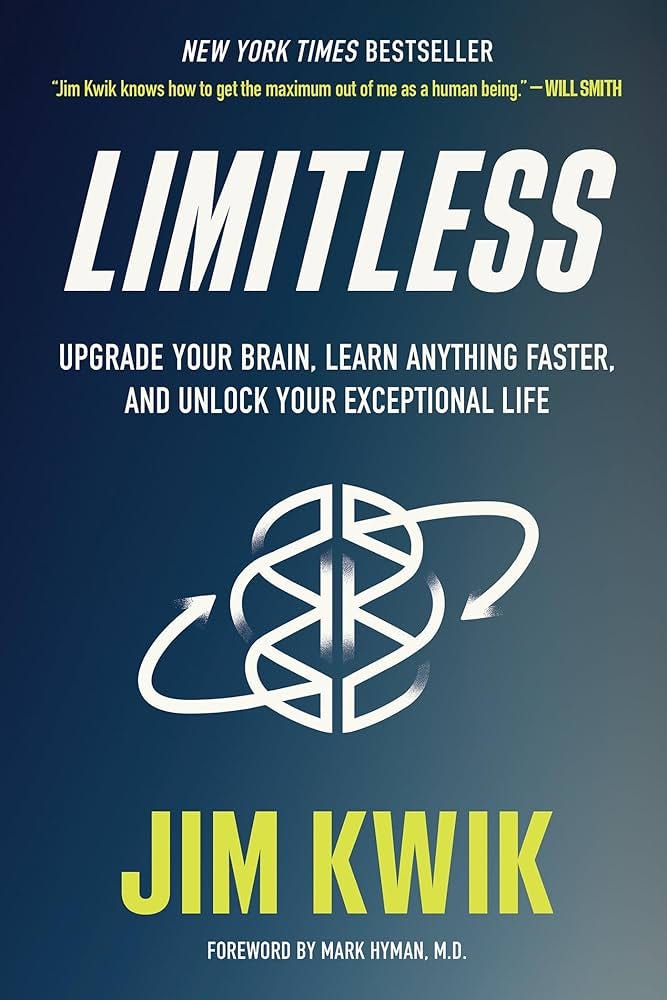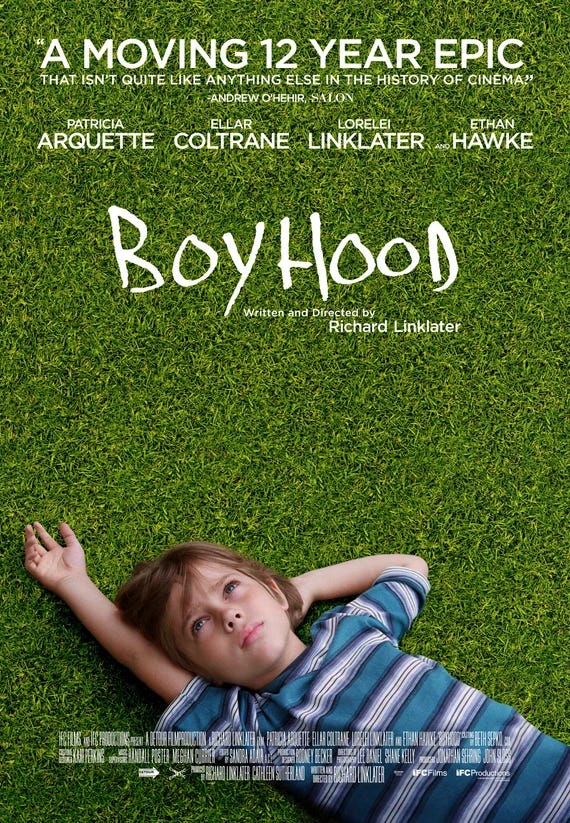Jazzy June at Minerva University (2024)
Starting my own personal podcast, a practical tip for college living, four cornerstone courses, and two hundred lifelong friends
PS. Would love for you all to have a listen to a brilliant ‘Humans of Minerva’ podcast episode I hosted with a Minerva Masters student, ‘Tiffany Rendall’ who is pursuing an MS in Decision Analysis. Learn more about Tiffany’s spiritual awakening, her parenting journey, her take on forgiveness, compassion and humility, her Master’s thesis on religious claims and values, and her plans for the future!
Link:
Stay tuned for another wonderful episode to be released very shortly, where I interviewed my dynamic, athletic and multi-faceted classmate, Braydon Rutherford from South Africa.
Now, back to the newsletter….
Starting a personal podcast titled ‘University Unravelled’
My fabulous learning and growth journey as a host on ‘Humans of Minerva’ coupled with the daunting thought of a long, four-month summer break ahead pushed me to begin ideating the theme for my personal podcast. I wanted the topic of the podcast to be something I personally connected with, something I had some level of expertise and credibility on, and finally, a topic which would be relevant to a majority of people in my personal network of friends, family, classmates and colleagues. From spiritual wisdom to emerging technologies to creative writing, my mind finally settled on this one big word that defines four prime years of our lives, called ‘University’.
‘University Unraveled’ is a podcast which aims to provide a firsthand insight to high school students from grades 9-12 about the authentic university experience, in the process aiding their decision-making journey as they finalize the country, major and specific institution which they will be devoting the next four years of their lives to. Advising them on how to make the most of the 360-degree university experience, far beyond the classroom, both personally and professionally. The podcast will cover application process and tips, academics, social life, networking, clubs, career exploration, internships, homesickness, intentional adulting, publishing research, connecting with professors, budgeting, and much more.
This one word ‘University’ has become too loaded with negative connotations for high schoolers frantically filling out applications left, right and centre. On a macro level, the podcast aims to replace these negative emotions of stress, anxiety, fear, confusion, and apprehension with positive emotions of curiosity, excitement, freedom, responsibility, and hope with which high schoolers should ideally approach their ‘Day 1’ on campus.
These are four prime years of a young man or woman’s life and hence every decision must be made consciously rather than just ‘following the herd’. Hearing from their seniors, students who have walked the path, made the mistakes, and learnt the lessons along the way, our young high schoolers will be guided, inspired and advised on how to make their choices wisely, considering ‘the overall experience’ beyond just the ‘prestige’.
The progress update
It’s been a month since starting the podcast, and boy, has it been a lot more work than expected. Many hours must be devoted into being well prepared before each episode, and hours must be devoted to the editing, refinement and promotion of each episode on multiple platforms. As guests, we only see the one-hour episode itself, unaware of the balancing nine hours put in ‘behind the scenes’ to deliver to us that one hour of high – quality content. But, not to complain. This last month of podcasting has taught me so many invaluable skills right from editing to marketing to refining my hosting abilities with every episode, and it has been thoroughly fulfilling to build everything ‘from the ground up’.
So far, I have hosted fifteen episodes with friends and family from UCLA, USC, Oxford, UBC, NYU, Swarthmore, Monash, Bocconi and more. Universities which you can expect on the podcast over the next set of episodes include Brown, Harvard, LSE, CMU, Ashoka, Cornell, Purdue, UC Berkley and more! The target before I fly to Taiwan on September 2nd is to publish fifty episodes on my YouTube channel, so please keep me accountable :).
If you are interested in:
· Being featured and highlighted on a podcast and creating high-quality content to build your personal brand
· Engaging in a reflective, introspective conversation about your growth, development and transformation through university
· Guiding the way for your juniors by sharing your insights, advice, and wisdom
· Passionately building a strong case for your university which you believe deserves a stronger spotlight on a global stage
· Or just helping out your old pal, Arya Dharod to achieve his KPI’s …
Please feel free to reach out at arya@serenestrokes.com and nominate yourself or a friend as a guest on ‘University Unravelled’! More updates to come in my August newsletter, to see if I can hit my milestone of 50 episodes on the podcast!
A practical tip for college living
The campus is a cocoon
At Minerva, we don’t have a campus to call our own. We all live in a single apartment building with basic facilities like rooms, bathrooms, a kitchen and a few living spaces. Other than that, if we need to use the library, gym, grab lunch with a friend, go to a networking event, even take a walk to clear our head, we must exit our so-called ‘campus’ and head out onto the city streets.
I’ve had the privilege of visiting some beautiful US university campuses like Brown, Swarthmore and Rice: they truly are a haven for students to study, play, relax and bond, especially for students in ‘college towns’, where there really isn’t a great reason to ever exit the campus gate.
The harsh truth is that the campus is still a massive ‘comfort zone’: it’s safe, surrounded by students like yourselves, and often leaves you unaware and immune to the real-world struggles and livelihoods of people just beyond your campus gate. The campus is not a microcosm of the real world.
Get out of the campus and onto the city streets. Go to the public library, go to parks outside campus, talk to locals of your city, go party in different clubs, and best of all, roam the streets at midnight. This will give you a true feel for the place you go to school in – its people, its problems, its persona. You will learn so much from just talking to people beyond your classmates and professors outside this ‘academic bubble’ – talk to taxi drivers, waitresses, librarians, bartenders, policemen, even the occasional homeless man on the street. They will provide you invaluable insight into the true joys, hopes, fears, dreams and struggles of the ordinary man and woman of that city/town.
Thanks to Minerva’s lack of a physical campus, almost every day I was forced to be ‘out and about’ in San Francisco, interacting with the locals, and witnessing the extreme wealth inequality that is now a characteristic of most big cities, worldwide. I have had classmates who felt personally compelled to begin volunteering at homeless shelters or food banks after walking the streets of the ‘Tenderloin’, the city’s homelessness hub. During those eight months in San Francisco, I can proudly claim that I lived in the city as a ‘citizen’ and not just a ‘student’.
Be safe, but know the value of being a little uncomfortable during these university days. Beyond just the campus, make an effort to make the entire city ‘your home away from home’ for those few years. Live like a local, not just a tourist.
Academics at Minerva – Cornerstone courses
HC highlights
1) Complex Systems – #conformity
Conformity and contrarianism are a delicate balance between going with the flow (for harmony) and going against the current (for progress). It is unwise to always be a conformist or always be a contrarian, hence each situation must be independently analyzed before making a decision. Changing social norms in an overall rigid society is not easy, but there are practical frameworks and strategies like ‘the theory of change’ that can be implemented with outstanding results.
Real-world examples:
· Conformity. Rebelling for the sake of rebellion is often a waste of time, energy and an easy way to destroy relationships. There is some truth in the saying, ‘go along to get along’. We all brush our teeth, wear our clothes, and eat with our mouths closed because these are social norms and breaking them leads to ostracization. Whenever we find ourselves in a new environment, industry, social circle, it’s always a safe bet to begin with a conformist approach. ‘In Rome, do as the Romans do’ – follow the herd until you learn why everyone moves in a certain direction. This will give you time to adjust, learn, and simultaneously gain the trust and friendship of peers in a new social system, which will be crucial if and when you eventually become a contrarian. ‘First learn the rules by heart, and only then begin to break the rules that don’t make sense’. Read the rulebook thoroughly because it will help you understand that 1) not all rules are unreasonable, and 2) for the rules that are, what is the motivation or reasoning behind keeping that rule in place still?
· Contrarianism: Now that you are well settled into this new environment, it’s time to ‘swim upstream’. Question everything, expose underlying assumptions, take nothing at face value. So many traditions and rituals or old patterns of thinking exist because they had a meaning/purpose in the past, but carried on till the current day despite being irrelevant, just because nobody had the courage to ask a simple question. Ask the basic questions and one way or the other, they will yield valuable, insightful answers from within. Why do we even go to university? What do we earn money for? Why become a parent? Why engage in meditation? Why scroll through social media? Why? Get crystal clear on the ‘why’, and the ‘how’ will fall into place because you are intelligent enough to figure it out. Contrarianism gives birth to new ideas, ventures, schools of thought, literal schools like Minerva, belief systems, and worldviews – it’s a useful tool in the toolbox of any thought leader, entrepreneur, visionary and change-maker who is bold enough to be 'the square peg in the round hole’.
· Shaping social norms through the ‘Theory of change’. Let’s be intentional about creating social norms that serve us rather than harm us, both in our own lives, and the world at large. Let’s consider the social norm of ‘creating a more positive, loving, accepting household’, as an example. Now, using the theory of change, break down the intended ‘change in behaviour’ into five parts: inputs, activities, outputs, outcomes, impacts.
o Inputs: The family needs to begin by investing in each other. Spending time together. Openly discussing conflicts and pain points. Being willing to communicate, apologize, compromise.
o Activities: These are specific activities that can take the family closer to their desired goal, like ‘no phones during meal time’, weekly outings, game nights, intentional hugging every day, garden walks, etc.
o Output: Tangible change should be visible through a number of indicators: the amount of quality time spent together, reduction in the number of arguments or debates at home, amount of positive physical contact every day, etc. Some ‘changes’ are harder to measure quantitatively than others but even a qualitative description is a great indicator of progress.
o Outcomes and impact: The short-term outcome of this change could simply be a reduction in conflict and increase in overall harmony in the house. However, in the long-term, the positive consequences of such a change could include greater alignment on important family decisions like where to live, how to spend money, etc., and could help keep the family aligned and bonded through ‘rainy days’, through ‘thick and thin’.
2) Empirical Analyses – #scienceoflearning
In school, we learn everything under the sun: math, science, history, geography, literature, French, economics, physics and music theory. It’s time to learn how to learn because this is a science in and of itself. The passive lecture format which most schools and universities continue using today has proven to be ineffective for the long-term retention and true understanding of crucial material. Research in the ‘science of learning’ has uncovered various techniques/principles that are way more effective, while also making learning fun – something we forgot was so important, somewhere along the way.
Real-world examples:
· Being a lifelong learner. For our young adults today, graduation day is not the final day of learning. We must constantly re-invent ourselves and upgrade our skills and knowledge every few years, in this rapidly changing VUCA world. Whether it is learning a new subject altogether, or just a new language or skill, there are ways to speed up the process while simultaneously improving effectiveness:
o ‘The generation effect’ – re-producing the material will tighten your grasp around it. Write an article, make a video, explain the concept to a friend, and it will uncover your own hidden knowledge gaps.
o Interleaving: Nobody can stay focused on one task for hours on end. Alternate between the different skills or subjects you are learning, to give yourself variety and mental breaks. You will find that certain concepts or principles will effectively transfer from math to philosophy and vice versa, which will boost your understanding of both subjects.
o Dual codes: Create multiple sensory inputs for the same information: use visuals, audio, and text through videos, podcasts and books, because different forms of sensory input are stored in different parts of the brain, giving you multiple ‘hooks’ to later recall one piece of information.
o Chunking: Chunk information into broader buckets for easier recall, like breaking up a grocery list into fruits, proteins, vegetables, and dairy vs. trying to remember every single item on the list.
o Different contexts: Apply the same information outside the context in which you learnt it. Apply a math concept to teach somebody how to live a better life or a literature concept in your economics class. In fact, this is exactly how I am strengthening my understanding of these HCs through this newsletter!
· Becoming more effective teachers: Even if we aren’t formal ‘teachers’ or ‘professors’, we all explain concepts on a daily basis to our friends, co-workers, and children – if we can explain information to the people around us keeping in mind these ‘learning principles’, not only will it help them retain knowledge better, but it will also solidify and strengthen the neural pathways in our brains associated with the information. Most educational systems need a strict re-design, from first principles, keeping in mind that all our courses, subjects and individual lessons in the classroom are taught from the ground up, with the sturdy foundation of the ‘science of learning’.
· Psychology and neuroscience: This is a vast, upcoming field of study and we are just at the cusp of beginning to understand how the brain learns, processes and retains information. As we map out the entire brain, neuron by neuron, creating the most detailed brain map in history, it will surely provide great insight into how human beings pick up a new skill/hobby or internalize a concept taught in the classroom. As we explore the furthest reaches of the cosmos, it’s also crucial to take a deep look inward and begin to just scratch the surface of the most powerful computer that lies at each of our disposal, in the form of the human mind. If this field of research is of interest to you, go ahead and explore the limitless possibilities of an ever-expanding subject area, where research findings and conclusions will directly impact millions of people across the globe to ‘learn more efficiently and effectively’.
Student spotlights
Yelim Lee (South Korea)
As a passionate student of neuroscience, research is a top priority for you, to build your skills and experience in a field that is a potential career path for you, after graduation. Say more about your valuable experience being a research assistant at Harvard University, at the Bonawitz Computational Cognitive Development Lab.
Sure! I was very fortunate to have been provided this opportunity by Minerva. During our first year of work study, the ‘Psychology Lab’ work study team was over forty students strong, hence through an innovative collaboration between Minerva and Harvard University, select work study students were invited to conduct research under Dr. Rosie Aboody, a postdoctoral research fellow at both Harvard and MIT. Dr. Aboody’s research focused on child psychology (how children learn and retain information), which is relevant to me because this is a field I potentially see myself working in after graduation.
We assisted Dr. Aboody with all aspects of her research process, like preparing consent forms, documenting verbal consent from the children, watching videos of the children learning and doing a direct verbal transcription of what the children were saying. More than anything, the value of this experience was all the hidden gems, side comments and deep conversations we had with Dr. Aboody, helping me learn from a highly accomplished professional in the field, who became a great professional mentor in my life.
The most pleasant surprise of this position was that I learnt the sheer number of tiny considerations that went into designing a research study, like the utmost care given to ethical considerations especially since we worked with young children, and designing the entire study with such ‘attention to detail’, because something as tiny as lighting, noise, colours of the room or the order of presenting instructions to the children could potentially lead to researcher bias when interpreting results and drawing conclusions. Being a researcher is all about thinking deeply through your study design, and establishing that clear cause-effect or correlational relationship between your independent and dependent variables, while minimizing all confounding variables, which sounds simple but is so difficult when you are working with humans vs. lab rats or hamsters.
Another massive takeaway was that even highly accomplished, busy professionals in the field are willing to extend a helping hand to a college student like myself, provided we take that extra step forward and outwardly express our curiosity and enthusiasm to learn. Dr. Aboody was genuine and enthusiastic about helping us find potential internship or research opportunities, and also offered to connect us with her friends in the field, if we were interested in specific niches of psychology or neuroscience. Being at a school like Minerva where each class is designed with these ‘science of learning’ principles in mind, I’ve become obsessed with the question ‘How do we learn as human beings?’ and find myself on an on-going quest for the answer.
‘Obsessed’ is clearly not an understatement when it comes to your passion for this field of study. Talk us through your work with the ‘Minerva Psychology’ team as a ‘Psychology lab intern’ during your first semester at Minerva.
The work we did for the ‘Psychology lab’ at Minerva was more analytical and more focused on secondary research vs. hands-on study planning, compared to my experience with Dr. Aboody. Here, our team was investigating the question ‘How does music affect one’s mental and emotional state of being?’, hence we did a deep dive into analyzing previously conducted studies that focused on this topic area. We began to read and summarize the methodologies of these studies, analyzed the findings and the strengths and limitations of the study design, while also trying to design hypothetical smaller-scale, remote studies of the original experiment which we could potentially replicate as university students, for example transforming an experiment into an online survey that could be sent to our classmates for data collection.
This experience was a true deep dive into the world of high-quality psychological research, where I went beyond the Quizlet flashcards we used during IB psychology to summarize a study, right to reading the actual PDF authored by the study designers and analyzing their raw data.
Much gratitude to Dr. Mark Sheskin, our psychology professor at Minerva, whose attentional to detail and thoroughness even while giving feedback, word by word, line by line, on a 14-page PDF we sent him, taught me the qualities I must hone in myself as an upcoming researcher in this field.
I am sure that attention to detail was also a necessary skill to develop when you delivered your TEDx talk on the formulation of individual identity, titled ‘Embracing a mother’s hug’.
This talk was a special moment in my life, because it was one of the first proactive decisions I made by reaching out for an opportunity vs. the opportunity being handed right into my palms by parents or teachers. A proud moment, indeed. I applied for my talk and made it past the initial interview, the second boot camp, and was then selected for the final roster of talks to be delivered.
I was assigned a mentor who gave me constructive criticism and a valuable, experienced perspective on my content – he honed both the content and the level of professionalism in my talk, while also working with me on various presentation skills including body language, facial expressions, voice modulation, tone and volume of speech, intonations, building and releasing suspense, and much more.
My script was far from perfect and would undergo drastic changes over the course of the next few months, until the ‘big day’. I started out with a talk focusing on advice and inspiration to high school students on how they could ‘develop into well-rounded, holistic individuals’ and be ‘better people’. Starting out, I truly resonated with my script and delivered the talk whole-heartedly during initial practice sessions. Slowly but surely, by spending more time in quiet reflection and introspection and sitting with the words I had written, a light bulb went off in my mind. I realized that all my life, I had linked my personal identity to performance – I needed to be a good student, daughter, sister, friend, niece, cousin, athlete and only then would I be proud to call myself ‘a nice person’. This realization hit me hard. I no longer resonated or identified with the talk I had written so passionately just a few months ago. I re-wrote the title and with that, gained the courage and confidence to approach my mentor and tell him that I was making a major pivot.
The new title of my talk was ‘Embracing a mother’s hug’ and the focus was now on the powerful concept of unconditional love. The beauty of a mother’s hug is that it will always love you for who you are, and embrace you even tighter during your lowest moments of self-esteem and confidence. But, neither is it complacent. Alongside all the unconditional love and affection our mothers shower us with, there is a constant gentle push to always be reaching higher and farther in pursuit of our goals and dreams. This is the beautiful ‘yin and yang’ that is a mother’s hug, which is a metaphor I powerfully believe in, to this day, for how we should treat and view ourselves as individuals.
It was heartwarming the next day in school, to hear teachers and fellow classmates sharing how they resonated with the message of my talk, as well as a beautiful comment one mother made for me on YouTube (somebody who had lost her own mother as a teenager) who said, ‘May this message be a nudge not only to individuals attempting to find their own legacy in life but also to parents like myself to offer care and refuge to our kids that becomes a reassuring platform from which they can emerge their best selves…’.
I love unpacking the multi-faceted and diverse aspects of ‘the Minervan personality’. On top of being a neuroscience researcher and a TEDx speaker, turns out you are also a budding entrepreneur. What’s the story behind the ‘Fallen yellow project and business’?
This was a joint initiative I undertook with my sister, who is also a fellow Minervan. Covid-19 was a difficult time for us in Korea – people lost their sense of community, morale was low, and many were struggling with anxiety, depression, and loneliness. My sister and I, grateful to still have each other and our parents by our side, decided that we needed to take positive action to help those struggling, right in front of our own eyes.
The name ‘Fallen yellow’ represents the yolk chopping off from the egg. You guessed it – egg tarts! My sister and I, with a shared passion for baking, began to bake egg tarts which we took to school as a simple ‘act of kindness’ to offer school staff, teachers, and all students. Especially for the new students, this made them feel welcomed and recognized, while also giving them an excuse to connect with me and my sister, send us a text on social media, and make their first friends, in this new environment. Once my sister graduated, I spear-headed the project myself, and within months, realized that this had the potential to be my very first venture. I wanted to turn the ‘project’ into a ‘business’.
I began advertising the egg tarts on social media and taking bulk orders for birthday parties or school events, while boosting sales through the posting of freshly baked egg tarts right out of the oven! I made a special set of egg tarts for Valentine’s day with a red heart at the centre of each piece. I also designed customized egg tarts with a drawing or a name/short message, on each tart.
It's an indescribable positive feeling to take a personal hobby of yours, and convert it into something larger – both a business that creates revenue to self-sustain, but also an initiative that spreads happiness and love in your community!
Hubert Pysklo (Poland).
You, my friend, are having an action-packed and exciting summer break, working in venture capital in Poland. But let’s rewind a couple of months ago to your first ever experience working in this industry, thanks to your civic project at Minerva with ‘Network VC’ in San Francisco. How was the experience and what have you learnt along the way?
This was my very first deep dive into the world of VC, through my year-long civic project at Minerva. Our civic partner was a Minervan alumni who was currently working for a VC firm in San Francisco. She walked us through our project mission, which was to help the firm with automating their tedious processes, like automating deal flow, initial screening and analysis of pitch decks from entrepreneurs, etc. We developed an automation plug-in for ‘Network VC’ to analyze start-ups based on the investment strategy the fund currently employed, doing the initial screening with a set of pre-programmed criteria, to narrow down many potential applicants to the few entrepreneurs who would be considered more in-depth by an actual human being at the fund.
My major takeaway from the experience was that an AI/ML model is only suitable for the first round of screening in VC, however more thorough evaluation and the final decision must be made by a human being with human judgement. In the VC industry, it is well known that Start-up ideas may pivot every few months, so you often invest more in the people than the idea itself, however the judgement of a team’s capability goes beyond raw data and past accomplishments, requiring more intimate human interactions and analysis.
Fast-forward to today, and I am honoured to be working for ‘SpeedUp Venture Capital Group’ in Poland. My day-to-day work involves a ton of scouting – going to conferences, networking events, browsing Linkedin, having my eyes and ears wide open wherever I go, and finding potential entrepreneurs who our fund can support to bring their ideas and companies to life. When I’m not scouting, I assist with current deals the company has already made, for example supporting a German company focused on reusable packaging which forced me to deep-dive into an industry which I knew almost nothing about previously. Finally, I write investment memos for the founders of the fund, which include specific details about the team profile, market size and growth rate, product description, current product traction, and exit opportunities like mergers, acquisitions, IPOs, etc.
To an aspiring entrepreneur my major insight from working in VC is that you have to be coachable and open minded – confidence is appreciated but not ego.
Diving deeper into your intellectual curiosity about the world of finance, let’s hear more about being a speaker (not once, but twice!) at the European Financial Congress. What could your value-addition possibly have been as a teenager in a room full of working professionals?
The youth and Gen-Z perspective is increasingly playing a huge role in conferences and networking events, because we truly are the future. Working professionals decades older than us are genuinely curious about our take on complex topics in politics, economics, sustainability and beyond. Age is just a number.
During my first experience at the EFC, the discussion revolved around the innovative use-cases of blockchain technology in finance. I moderated a panel of speakers who dived deep into this topic, hence I ensured to prepare with nuanced questions and intensive research into both the topic and each speaker, weeks before-hand. Moderating a panel is such a lovely opportunity to highlight yourself, and of course you don’t have to be the expert, just the most curious kid in the room. It was such a beautiful discussion about the potential of blockchain to digitize financial systems globally, and make financial services more accessible and empowering to the underprivileged in remote and rural areas of our world. Blockchain has the potential to provide financial services like insurance, loans, money transfers to anybody in the world with a mobile phone and internet connection, especially the ‘unbanked’ who must walk many miles to reach their nearest ATM or bank branch.
This year, I was part of the debate ‘Should the European Union become the United States of Europe?’, where my role was to represent the general opinion of the European Gen-Z. The over-arching concept here is the idea to make Europe one federalized country with a centralized government making key economic decisions like fiscal and monetary policy, interest rates, etc. This potentially may reduce the significant economic disparities between Western, Central and Eastern Europe. I personally was against the concept for various reasons, but the debate pushed me to think deeply because I fought ‘for the motion’, hence was forced to take a stance that did not align with my deep, personal beliefs – a powerful lesson in objectivity.
You talk big, but you also practice what you preach. Let’s discuss the non-profit venture you started as a high schooler in Poland, called ‘Econverse’. And in the process, let’s introduce readers to another highly accomplished and wise Minervan upperclassmen, who is also worth checking out on the ‘Humans of Minerva’ podcast.
The macro idea was to empower Polish students with the skills and mindsets that are not covered in our Polish educational system, which in my opinion, is somewhat theoretical and out-dated. In 2021, with my co-founder, Jan Bartkowiak (learn more about Jan’s exciting journey, on the ‘Humans of Minerva’ podcast!), we organized a conference titled ‘We can’, which was essentially a career fair for Polish high schoolers, where we highlighted various educational opportunities, programs, and potential career paths which students may never even have considered. This first event was a major success, which convinced us of the market need for our idea. Next, we decided to narrow down to a specific skill set which we were both passionate about developing in our peers: the entrepreneur’s toolkit.
Econverse aims to connect high schoolers to mentors and aspirational figures in the world of business and start-ups. We organize events and conferences where hundreds of high schoolers who want to take that first step into this new world of possibility, are encouraged to come and form teams, attend sessions on different entrepreneurial skills and mindsets, and then apply their learning to build their own crazy ideas which they pitch in front of a jury of founders and angel investors, to win awards that could potentially finance these ‘crazy ideas’. We strive to create a risk-free environment so that students truly have no ‘box’ which they have to ‘think outside of’ – its limitless.
Over the years, we’ve brought in 2,000 + participants and 200+ mentors from the real business world who have helped a few teams to actually bring their business ideas to life and start real companies. We have scaled to multiple cities across Poland, and recently had our grand finale event in Warsaw where we hosted over five hundred students at the Polish National Stadium. In our next chapter, we hope to expand beyond Poland to countries like Slovakia, Hungary, the Czech Republic, and eventually, all of Europe. We have partnered with VC funds in these various countries which will help us scale and expand, truly bringing to life our new motto – ‘Accelerate Europe’.
We have been in talks to partner with companies like Google, Orange, McKinsey, UNICEF, the Stanford club of Poland, to help our mission reach more ambitious and intelligent high schoolers across Poland and beyond.
A huge shout-out to the entire organizing team of Econverse for your faith and dedication to excellence. I will always remember the words of one of my teammates after an intense conference went smoothly, where she said, ‘Hubert, thank you for Econverse because it is one of the things in my life that makes me happy and enthusiastic about the world, and eager to empower my community’.
Build hard things. Stay hungry, stay foolish.
Book of the month
Movie of the month
Poem of the month
Learn from the farmer
The one who lives in a village
With no electricity
Walks a mile to collect water
In a bucket
Relieves himself in the fields
Doesn’t even know the ‘ABC’s’
Of the alphabet nor of modern life
And speaks only his native language
There is so much to learn
From a farmer
He walks barefoot on the Earth
Doesn’t avoid the sun’s bright rays
Under the comfort of caps, sunglasses or sunscreen
He rises and sleeps with the sun
And spends his days caring for mother Earth
Harnessing its magic
Putting food on the world’s table
He sleeps outside
Underneath the stars
No quilt, no pillow, no AC
On the largest and most comfortable bed ever built
The soil of the planet
And while you pity him
For the tough, rural life he lives
Unaware of modern luxuries and comforts
He laughs at you,
You urban folk
Who work 9-5 jobs filled with stress
To one day save up and purchase
A tiny birdcage
With no greenery or fresh air
Where you wait patiently for Mr. Death
While he will live a long, healthy, simple life
The entire jungle to himself
For just a few pennies
Wow! That was long. Thank you so much for being patient with me and reading (or skimming) to the end.
Please subscribe to my monthly newsletter if you would like to stay updated with my monthly adventures as I travel to six global cities (San Francisco, Taipei, Seoul, Buenos Aires, Hyderabad and Berlin) over the next three years with Minerva University. Until then, Au revoir!
PS. Fifty days to go for Taiwan, and the countdown has officially begun!




